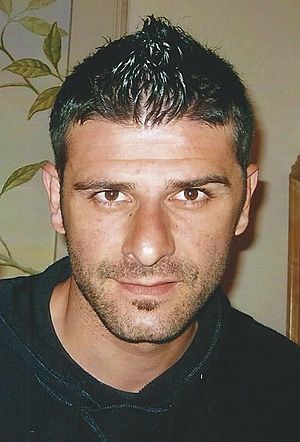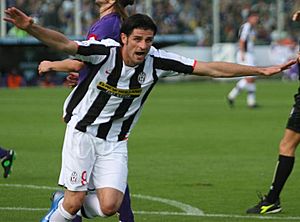Vincenzo Iaquinta facts for kids

Iaquinta in 2010
|
||||||||||||||||
| Personal information | ||||||||||||||||
|---|---|---|---|---|---|---|---|---|---|---|---|---|---|---|---|---|
| Full name | Vincenzo Iaquinta | |||||||||||||||
| Date of birth | 21 November 1979 | |||||||||||||||
| Place of birth | Cutro, Italy | |||||||||||||||
| Height | 1.91 m (6 ft 3 in) | |||||||||||||||
| Position(s) | Striker | |||||||||||||||
| Senior career* | ||||||||||||||||
| Years | Team | Apps | (Gls) | |||||||||||||
| 1996–1997 | Reggiolo | 33 | (6) | |||||||||||||
| 1998 | Padova | 13 | (3) | |||||||||||||
| 1998–2000 | Castel di Sangro | 52 | (8) | |||||||||||||
| 2000–2007 | Udinese | 176 | (58) | |||||||||||||
| 2007–2013 | Juventus | 86 | (30) | |||||||||||||
| 2012 | → Cesena (loan) | 7 | (1) | |||||||||||||
| Total | 374 | (106) | ||||||||||||||
| International career | ||||||||||||||||
| 2005–2010 | Italy | 40 | (6) | |||||||||||||
|
Medal record
|
||||||||||||||||
| *Club domestic league appearances and goals | ||||||||||||||||
Vincenzo Iaquinta (born 21 November 1979) is an Italian former professional footballer. He played as a striker, which means he was mainly responsible for scoring goals.
Before joining Juventus in 2007, he played for several smaller Italian clubs. He then moved to Udinese in 2000, where he spent seven seasons. During his time at Udinese, he even played in the UEFA Champions League, a top European club competition.
After a loan spell at Cesena in 2012, Iaquinta returned to Juventus. He retired from football in 2013.
Iaquinta also played 40 matches for the Italy national football team between 2005 and 2010, scoring six goals. He was part of the Italian team that won the 2006 FIFA World Cup. He also played in the 2010 FIFA World Cup, scoring a goal in both tournaments.
Contents
Club Career Highlights
Early Football Days
Vincenzo Iaquinta was born in Cutro, Italy. His parents moved to Northern Italy for work when he was young. He started his professional football journey with Reggiolo in the 1996–1997 season. He played 33 games and scored six goals there.
In January 1998, he moved to Padova, a club in Serie B, which is Italy's second-highest football league. His time at Padova was short, with 13 appearances and three goals. After six months, he joined Castel di Sangro in Serie C1. He played 52 games and scored eight goals for them between 1998 and 2000.
Shining at Udinese
In June 2000, Iaquinta joined Udinese, a team in Serie A, Italy's top league. In his first season, he played 16 games and scored two goals. He slowly became a key player for the team.
During the 2003–2004 season, he played 32 games and scored eleven goals. Udinese finished seventh in the league, which helped them qualify for the UEFA Cup. In the 2004–2005 season, he scored 15 goals in 39 games. Udinese finished fourth in Serie A, earning a spot in the UEFA Champions League.
In the 2005–2006 season, Iaquinta scored 17 goals in 34 games. This included a special moment: he scored three goals (a hat-trick) in his very first Champions League group stage match against Panathinaikos. He continued to play well, scoring 14 goals in his final season with Udinese (2006–2007).
Time with Juventus
Juventus, one of Italy's biggest clubs, signed Iaquinta on 19 June 2007. He joined on a five-year contract. In his first season (2007–2008), he was often a substitute for star strikers Alessandro Del Piero and David Trezeguet. However, he still managed to score nine important goals in 29 games, including a last-minute winning goal against Napoli.
In the 2008–2009 season, Iaquinta became a more regular starter, especially when other strikers were injured. He scored a goal against Chelsea in the UEFA Champions League, which was Juventus' 600th goal in European competitions. He finished that season with 16 goals in 38 games.
For the 2009–2010 season, Iaquinta became a definite starter for Juventus. However, a major injury kept him out of action for six months. In the 2010–2011 season, he played less often as new players joined the team.
Loan to Cesena and Retirement
In January 2012, Iaquinta went on loan to Cesena until the end of the 2011–2012 season. He made his debut for them in February, scoring a penalty. He played seven games for Cesena, but injuries continued to affect him.
After his loan, he returned to Juventus. Although Juventus won the league title, Iaquinta continued to struggle with injuries and did not play any games in the 2012–2013 season. On 22 July 2013, after his contract ended, he announced his retirement from football. He shared his plans to become a coach.
International Career
Vincenzo Iaquinta first played for the Italian national team on 30 March 2005. His first international goal came in Italy's opening match of the 2006 FIFA World Cup on 12 June. He scored Italy's second goal in a 2–0 win against Ghana.
He played in five of Italy's seven matches in that tournament, including the semi-final against Germany and the final against France. Italy won the World Cup that year!
Iaquinta also played for Italy in the 2010 FIFA World Cup. He scored a penalty in a 1–1 draw against New Zealand. His last international game was on 24 June 2010, when Italy was eliminated from the tournament. In total, he scored six goals for Italy in 40 appearances.
Playing Style
Vincenzo Iaquinta was known as a tall, strong, and very fast striker. He was excellent at heading the ball and scoring goals from inside the penalty area. Because of his speed and athleticism, he was great at making runs to get past defenders. This helped him get into good scoring positions or create space for his teammates. He was also a threat on fast counter-attacks.
Even though he preferred to play as a main striker, he could also play in other attacking roles, like a second striker or a winger. He was good at holding the ball up for his teammates because of his strength. Throughout his career, Iaquinta often faced injuries, which sometimes limited how much he could play.
Personal Life
Vincenzo Iaquinta married Arianna Cucinotta on 14 June 2003. They have four children: two sons, Giuseppe (born 2002) and Edoardo (born 2004), and two daughters, Carlotta (born 2008) and Ginevra (born 2015).
Career Statistics
Club Appearances
| Club | Season | League | Cup | Europe | Total | ||||
|---|---|---|---|---|---|---|---|---|---|
| Apps | Goals | Apps | Goals | Apps | Goals | Apps | Goals | ||
| Reggiolo | 1996–97 | 14 | 1 | 0 | 0 | 0 | 0 | 14 | 1 |
| 1997–98 | 19 | 5 | 0 | 0 | 0 | 0 | 19 | 5 | |
| Total | 33 | 6 | 0 | 0 | 0 | 0 | 33 | 6 | |
| Padova | 1997–98 | 13 | 3 | 0 | 0 | 0 | 0 | 13 | 3 |
| Castel di Sangro | 1998–99 | 25 | 3 | 3 | 0 | 0 | 0 | 28 | 3 |
| 1999–2000 | 27 | 5 | 0 | 0 | 0 | 0 | 27 | 5 | |
| Total | 52 | 8 | 3 | 0 | 0 | 0 | 55 | 8 | |
| Udinese | 2000–01 | 14 | 2 | 2 | 0 | 0 | 0 | 16 | 2 |
| 2001–02 | 22 | 2 | 4 | 1 | 0 | 0 | 26 | 3 | |
| 2002–03 | 26 | 7 | 2 | 1 | 0 | 0 | 28 | 8 | |
| 2003–04 | 29 | 11 | 2 | 0 | 1 | 0 | 32 | 11 | |
| 2004–05 | 31 | 13 | 6 | 2 | 2 | 0 | 39 | 15 | |
| 2005–06 | 24 | 9 | 1 | 1 | 9 | 7 | 34 | 17 | |
| 2006–07 | 30 | 14 | 2 | 3 | 0 | 0 | 32 | 17 | |
| Total | 176 | 58 | 19 | 8 | 12 | 7 | 207 | 73 | |
| Juventus | 2007–08 | 24 | 8 | 5 | 4 | 0 | 0 | 29 | 12 |
| 2008–09 | 28 | 12 | 3 | 0 | 7 | 3 | 38 | 15 | |
| 2009–10 | 15 | 6 | 0 | 0 | 3 | 1 | 18 | 7 | |
| 2010–11 | 20 | 4 | 1 | 0 | 3 | 2 | 24 | 6 | |
| 2011–12 | 0 | 0 | 0 | 0 | 0 | 0 | 0 | 0 | |
| 2012–13 | 0 | 0 | 0 | 0 | 0 | 0 | 0 | 0 | |
| Total | 88 | 30 | 9 | 4 | 13 | 6 | 109 | 40 | |
| Cesena (loan) | 2011–12 | 7 | 1 | 0 | 0 | 0 | 0 | 7 | 1 |
| Career total | 368 | 105 | 31 | 9 | 25 | 13 | 424 | 131 | |
International Appearances
| National team | Year | Apps | Goals |
|---|---|---|---|
| Italy | 2005 | 10 | 0 |
| 2006 | 9 | 1 | |
| 2007 | 3 | 0 | |
| 2008 | 3 | 0 | |
| 2009 | 10 | 4 | |
| 2010 | 5 | 1 | |
| Total | 40 | 6 | |
- Scores and results list Italy's goal tally first, score column indicates score after each Iaquinta goal.
List of international goals scored by Vincenzo Iaquinta
| No. | Date | Venue | Opponent | Score | Result | Competition | Ref. |
|---|---|---|---|---|---|---|---|
| 1 | 12 June 2006 | FIFA WM Stadion Hannover, Hanover, Germany | 2–0 | 2–0 | 2006 FIFA World Cup | ||
| 2 | 1 April 2009 | Stadio San Nicola, Bari, Italy | 1–0 | 1–1 | 2010 FIFA World Cup qualification | ||
| 3 | 10 June 2009 | Atteridgeville Super Stadium, Pretoria, South Africa | 3–3 | 4–3 | Friendly | ||
| 4 | 4–3 | ||||||
| 5 | 9 September 2009 | Stadio Olimpico, Turin, Italy | 2–0 | 2–0 | 2010 FIFA World Cup qualification | ||
| 6 | 20 June 2010 | Mbombela Stadium, Nelspruit, South Africa | 1–1 | 1–1 | 2010 FIFA World Cup |
Honours and Awards
Juventus
- Serie A: 2012–13 (Italian League Champions)
Italy
- FIFA World Cup: 2006 (World Champions)
Individual
- Coppa Italia top scorer: 2007–08 (Scored the most goals in the Italian Cup)
Orders
-
- CONI: Golden Collar of Sports Merit: 2006
- 4th Class / Officer: Ufficiale Ordine al Merito della Repubblica Italiana: 2006
See also
 In Spanish: Vincenzo Iaquinta para niños
In Spanish: Vincenzo Iaquinta para niños
 | May Edward Chinn |
 | Rebecca Cole |
 | Alexa Canady |
 | Dorothy Lavinia Brown |


